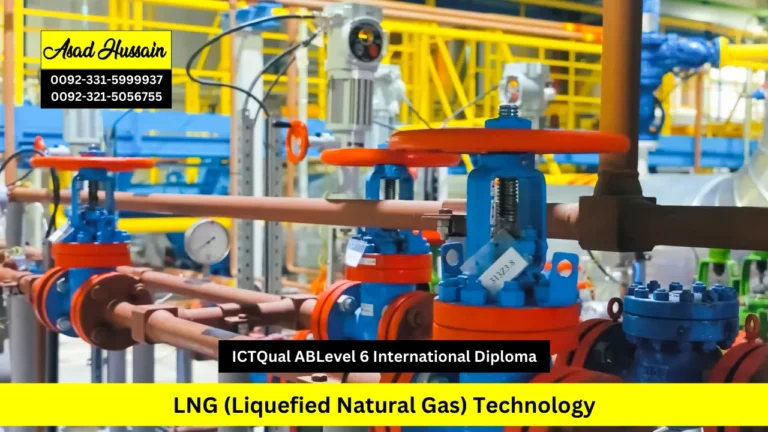The construction industry is a cornerstone of economic development, requiring skilled professionals to manage complex projects, ensure safety, and deliver high-quality outcomes on time and within budget. The ICTQual AB Level 6 International Diploma in Construction Management is a comprehensive program designed to equip learners with advanced knowledge and practical skills to lead construction projects successfully in diverse environments.
ICTQual ABLevel 6 International Diploma in Construction Management covers critical aspects of construction management, including project planning, risk assessment, cost management, procurement, quality control, health and safety, and sustainable construction practices. Learners will develop the ability to plan, execute, and monitor construction projects while complying with regulatory standards and international best practices.
Through a combination of theoretical learning and practical application, participants will gain strategic, analytical, and operational competencies essential for managing complex construction projects. The program prepares learners to oversee project teams, coordinate stakeholders, optimize resources, and implement innovative solutions in real-world construction scenarios.
Graduates of this diploma will be well-positioned to take on leadership roles in construction firms, consultancy agencies, infrastructure projects, and property development organizations. By completing this course, learners will enhance their professional credibility, improve career prospects, and contribute effectively to the successful delivery of construction projects globally.
Program Highlights
Study Units
Year 1 – Foundations of Construction Management
- Principles of Construction Management
- Construction Materials, Methods, and Technology
- Construction Law, Compliance, and Regulatory Frameworks
- Site Management and Supervision
- Health, Safety, and Environmental Management
- Fundamentals of Project Planning and Scheduling
- Cost Estimation and Budgeting in Construction
- Business Communication and Professional Reporting
- Introduction to Civil Engineering Principles
- Digital Tools and IT for Construction Projects
- Quality Control and Assurance in Construction
- Research and Data Analysis for Construction Studies
Year 2 – Applied Practices in Construction Management
- Advanced Project Planning and Control
- Construction Contracts and Procurement Management
- Human Resource Management in Construction
- Risk Management in Construction Projects
- Construction Economics and Financial Management
- Sustainable Construction and Environmental Practices
- Construction Equipment and Site Logistics
- Supply Chain and Vendor Management in Construction
- Quality Auditing and Continuous Improvement
- Construction Project Leadership and Team Development
- Case Studies in Construction Management
- Applied Research in Construction Operations
Year 3 – Advanced Strategic Construction Leadership
- Strategic Construction Project Management
- Advanced Construction Law and International Regulations
- Digital Construction and Smart Technologies
- Crisis and Disaster Management in Construction
- Global Construction Markets and Opportunities
- Leadership and Organisational Change in Construction
- Infrastructure Development and Mega Projects
- Performance Measurement and Benchmarking in Construction
- Ethics, Corporate Governance, and Sustainability in Construction
- Innovation and Change Management in Construction
- Advanced Research Methods in Construction Management
- Dissertation / Final Research Project in Construction Management
To ensure learners are fully prepared to meet the demands of the ICTQual AB Level 6 International Diploma in Construction Management, specific entry requirements are established. These criteria ensure candidates possess the necessary educational background, professional experience, and language proficiency to successfully complete the program and apply their knowledge effectively in construction management roles.
Age Requirements
- Applicants must be 18 years or older to enroll in this Level 6 qualification.
- Mature learners above 21 years are encouraged to apply, especially those with prior construction industry experience seeking career advancement.
Educational Requirements
- Candidates should hold a Level 5 qualification or equivalent in construction, civil engineering, project management, or a related field.
- Recognized international diplomas or qualifications in construction, engineering, or management may also be considered.
Professional Experience for ICTQual ABLevel 6 International Diploma in Construction Management
- Relevant work experience in construction project management, site supervision, or related roles is preferred.
- Experience in planning, budgeting, procurement, or coordinating construction teams enhances practical application of course concepts.
English Language Proficiency
- Non-native English speakers must demonstrate proficiency through recognized tests such as IELTS 6.0 or equivalent.
- Effective English communication skills are required for engaging with course materials, project reports, and professional construction documentation.
Meeting these entry requirements ensures learners are adequately prepared to engage with the course content and maximize learning outcomes. Enrolling in this diploma equips participants with the skills, knowledge, and professional credibility necessary to excel in construction management and lead projects to successful completion in a competitive global industry.
Upon successful completion of the ICTQual AB Level 6 International Diploma in Construction Management, learners will have developed the advanced knowledge, practical skills, and professional competencies required to excel in construction management roles. The learning outcomes are designed to be specific, measurable, and aligned with industry standards, ensuring graduates can apply their expertise in real-world construction projects, lead teams, and drive operational excellence.
Year 1 – Foundations of Construction Management
Principles of Construction Management
- Understand the fundamental concepts, processes, and responsibilities involved in construction management.
- Apply management principles to plan and organise small-scale construction projects.
Construction Materials, Methods, and Technology
- Identify and evaluate different construction materials and methods for various project requirements.
- Apply modern construction technologies to enhance efficiency and quality in building projects.
Construction Law, Compliance, and Regulatory Frameworks
- Understand national and international construction laws, standards, and regulations.
- Ensure compliance with legal and contractual obligations in construction projects.
Site Management and Supervision
- Develop skills to supervise construction activities, manage personnel, and ensure site efficiency.
- Implement best practices for coordinating multiple trades and stakeholders on-site.
Health, Safety, and Environmental Management
- Apply occupational health, safety, and environmental standards to construction projects.
- Identify potential hazards and implement preventive measures to ensure site safety.
Fundamentals of Project Planning and Scheduling
- Create basic project plans, schedules, and timelines using recognised planning tools.
- Monitor progress and adjust schedules to meet project objectives efficiently.
Cost Estimation and Budgeting in Construction
- Prepare accurate cost estimates and budgets for construction projects.
- Evaluate financial feasibility and control project expenditures effectively.
Business Communication and Professional Reporting
- Develop professional communication skills for reporting, presentations, and stakeholder engagement.
- Prepare construction documentation, including reports, proposals, and progress summaries.
Introduction to Civil Engineering Principles
- Understand fundamental civil engineering concepts relevant to construction management.
- Apply engineering principles to support project design and construction processes.
Digital Tools and IT for Construction Projects
- Utilise construction software, digital tools, and IT solutions for project management.
- Implement Building Information Modelling (BIM) and other digital technologies.
Quality Control and Assurance in Construction
- Apply quality assurance and control methods to maintain high construction standards.
- Conduct inspections and audits to ensure compliance with specifications.
Research and Data Analysis for Construction Studies
- Collect, analyse, and interpret data to support construction decision-making.
- Use research methods to evaluate project performance and propose improvements.
Year 2 – Applied Practices in Construction Management
Advanced Project Planning and Control
- Develop comprehensive project plans using advanced scheduling and control techniques.
- Monitor, analyse, and adjust project activities to ensure timely completion.
Construction Contracts and Procurement Management
- Understand contract types, procurement processes, and tendering methods.
- Manage contractual obligations and supplier relationships effectively.
Human Resource Management in Construction
- Apply HR practices to recruit, train, and manage construction teams.
- Resolve workplace conflicts and motivate teams to enhance productivity.
Risk Management in Construction Projects
- Identify potential risks and implement mitigation strategies.
- Monitor and review risk management processes throughout project execution.
Construction Economics and Financial Management
- Analyse project costs, cash flow, and financial performance.
- Apply economic principles to optimise resource allocation and profitability.
Sustainable Construction and Environmental Practices
- Implement eco-friendly construction techniques and sustainable project solutions.
- Evaluate environmental impact and adopt practices to minimise negative effects.
Construction Equipment and Site Logistics
- Manage construction equipment selection, utilisation, and maintenance.
- Plan site logistics to optimise workflow, storage, and material handling.
Supply Chain and Vendor Management in Construction
- Coordinate procurement, suppliers, and subcontractors to ensure project continuity.
- Apply supply chain strategies to reduce costs and enhance efficiency.
Quality Auditing and Continuous Improvement
- Conduct quality audits to assess compliance with standards and specifications.
- Recommend and implement continuous improvement initiatives.
Construction Project Leadership and Team Development
- Develop leadership skills to manage multidisciplinary teams effectively.
- Foster collaboration and enhance team performance through strategic planning.
Case Studies in Construction Management
- Analyse real-world construction projects to identify challenges and best practices.
- Apply theoretical knowledge to practical scenarios for problem-solving.
Applied Research in Construction Operations
- Conduct applied research to evaluate construction methodologies and processes.
- Present findings with actionable recommendations for industry application.
Year 3 – Advanced Strategic Construction Leadership
Strategic Construction Project Management
- Develop strategic plans for large-scale and complex construction projects.
- Apply advanced project management frameworks to ensure successful delivery.
Advanced Construction Law and International Regulations
- Understand international legal frameworks affecting global construction projects.
- Apply legal knowledge to manage cross-border construction operations.
Digital Construction and Smart Technologies
- Implement smart construction technologies and digital innovation in project execution.
- Use BIM, IoT, and digital monitoring tools for enhanced project control.
Crisis and Disaster Management in Construction
- Develop strategies to respond to emergencies, natural disasters, and project crises.
- Implement disaster recovery plans and maintain operational continuity.
Global Construction Markets and Opportunities
- Analyse trends in global construction markets to identify business opportunities.
- Evaluate competitive landscapes and strategic positioning for international projects.
Leadership and Organisational Change in Construction
- Lead organisational change initiatives to improve construction performance.
- Apply transformational leadership principles to enhance workforce engagement.
Infrastructure Development and Mega Projects
- Plan and manage infrastructure and large-scale construction projects.
- Assess technical, financial, and environmental considerations for mega projects.
Performance Measurement and Benchmarking in Construction
- Implement performance measurement frameworks to monitor project outcomes.
- Benchmark against industry standards to identify areas for improvement.
Ethics, Corporate Governance, and Sustainability in Construction
- Apply ethical practices and governance principles in construction management.
- Integrate sustainability considerations into strategic and operational decision-making.
Innovation and Change Management in Construction
- Develop and implement innovative solutions to improve construction processes.
- Manage organisational change to ensure adoption of new practices and technologies.
Advanced Research Methods in Construction Management
- Apply advanced research methodologies to investigate construction challenges.
- Produce evidence-based solutions to enhance operational efficiency and project outcomes.
Dissertation / Final Research Project in Construction Management
- Conduct a comprehensive research project demonstrating mastery of construction management principles.
- Analyse data, apply best practices, and present findings to industry standards.
The ICTQual AB Level 6 International Diploma in Construction Management is designed for ambitious professionals, students, and career-focused individuals seeking advanced knowledge in construction management, project planning, and operational leadership. This program is suitable for learners who aim to enhance their strategic, technical, and managerial skills in the construction and infrastructure industry.
Educational Instructors and Trainers
- Deliver professional training and development programs in construction management using international standards.
- Design curricula and learning modules to prepare students for practical construction leadership roles.
Environmental Advocates and Activists
- Promote sustainable construction practices and environmental stewardship in project planning.
- Influence policies and strategies to minimize ecological impact while maintaining project efficiency.
Students and Recent Graduates
- Acquire in-depth knowledge of construction management, civil engineering principles, and project supervision.
- Develop practical skills and competencies to pursue careers in construction, project management, and consultancy.
Career Changers
- Transition into construction management, site supervision, or consultancy roles with recognized Level 6 qualifications.
- Gain practical, strategic, and operational competencies to enhance career prospects and employability.
Policy Makers and Regulators
- Develop, evaluate, and enforce policies regulating construction standards, safety, and compliance frameworks.
- Promote ethical, sustainable, and responsible construction practices across projects and organizations.
This course is ideal for learners seeking to lead, innovate, and excel in construction management and project leadership. Graduates will emerge as competent, strategic, and professional leaders capable of improving operational performance, ensuring compliance with international standards, and successfully delivering construction projects in a global context.







